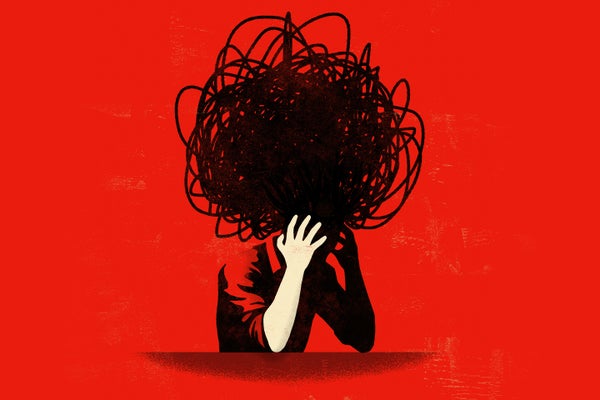
[ad_1]
January 9, 2025
3 min learn
Right here’s Why Unhealthy Sleep and Poisonous Ideas Go Hand-in-Hand
Findings reveal the memory-related mind processes that generate undesirable ideas when persons are sleep disadvantaged

Think about you might be attending a good friend’s housewarming occasion, and—in entrance of everybody—you spill a glass of crimson wine on their brand-new white sofa. You’re so mortified that each time you see this good friend afterward, you instantly consider the sofa mishap.
Analysis has proven that the way you react to that unwelcome recollection will depend upon how a lot sleep you get. In case you’re effectively rested, your mind will be capable to shortly suppress the adverse reminiscence. However in case you are somebody who’s affected by insomnia, then intrusive ideas about what occurred—and the disagreeable feelings connected—will most likely proceed to trouble you for a while.
Now a brand new examine revealed in Proceedings of the Nationwide Academy of Sciences USA offers perception into what, precisely, goes mistaken within the sleep-deprived mind when such undesirable ideas intrude. “This may very well be an vital piece of the puzzle in understanding why it’s that people who find themselves chronically sleep-deprived turn out to be at excessive threat of growing psychological well being issues,” says Scott Cairney, an affiliate professor of psychology on the College of York in England and senior writer of the findings.
On supporting science journalism
In case you’re having fun with this text, think about supporting our award-winning journalism by subscribing. By buying a subscription you might be serving to to make sure the way forward for impactful tales concerning the discoveries and concepts shaping our world right this moment.
Cairney and his colleagues confirmed in an earlier examine that sleep deprivation impairs folks’s skill to suppress undesirable ideas. However the crew needed to take these behavioral observations “one step additional,” he says. “What’s truly happening beneath the hood, within the mind, when persons are not getting sufficient sleep?”
Earlier analysis has demonstrated that the retrieval of recollections of previous occasions includes the hippocampus and that of a unique a part of the mind, the suitable dorsolateral prefrontal cortex (rDLPFC), is liable for suppressing that retrieval course of. Cairney and his colleagues hypothesized that sleep deprivation impairs the rDLPFC’s skill to “slam the breaks” on the retrieval processes, he says.
To check this, the researchers recruited 85 college students. First, the crew skilled them to affiliate photos of impartial faces with particular scenes, a few of which have been adverse, comparable to a automobile crash or a battle. “They type a wealthy connection between the face and the scene, so while you current them with the face in isolation, their brains will mechanically interact in a retrieval course of,” Cairney says.
Subsequent, the researchers divided the members into two teams. One group was made to remain up all night time whereas the opposite was allowed to sleep in beds within the lab. Members within the latter group have been monitored for a way a lot time they spent in rapid-eye-movement (REM) and non-REM sleep.
Within the morning the entire members have been proven photos of the faces they’d been beforehand skilled with, however this time, the members needed to both take into consideration the reminiscence they’d been skilled to affiliate with the face or to suppress it. All through this process, their mind exercise was measured utilizing a practical magnetic resonance imaging (fMRI) scanner.
The outcomes confirmed Cairney and his colleagues’ hunch. In contrast with the members who had slept, those that had stayed up all night time had considerably diminished rDLPFC exercise after they have been alleged to be suppressing intrusive ideas. Conversely, exercise of their hippocampus was elevated, doubtless as a result of the rDLPFC was not shutting down the retrieval course of it was partaking in. This discovering confirmed that sleep deprivation doesn’t trigger a normal decline in mind exercise, Cairney says, however reasonably appears to particularly have an effect on sure elements of the mind which might be concerned in government operate.
Out of the members who had slept the night time earlier than, the researchers additionally discovered a big optimistic correlation between the period of time they spent in REM sleep and rDLPFC exercise, particularly after they have been partaking within the reminiscence suppression process. “That’s attention-grabbing as a result of many problems related to debilitating intrusive ideas, comparable to despair and PTSD, are additionally related to disturbances in REM,” Cairney says.
The “intriguing” new examine suggests a key function that REM sleep appears to play in sustaining ample reminiscence management, says Zara Bergström, a cognitive psychologist on the College of Kent in England, who was not concerned within the work. She provides, nevertheless, that “it is going to be essential for future analysis to control REM sleep instantly” to substantiate whether or not it does have a causal function in controlling recollections and ideas.
Maria Wimber, a cognitive neuroscientist on the College of Glasgow, who additionally was not concerned within the analysis, provides that the brand new examine’s findings “have actual potential to tell therapeutic approaches.”
“Interventions that improve REM sleep may turn out to be a part of the remedy for problems which might be characterised by intrusive recollections, like post-traumatic stress dysfunction,” she says. One of these response may additionally be tried for acute trauma—a attainable safety measure to make sure that poisonous recollections and flashbacks by no means emerge in any respect.
[ad_2]